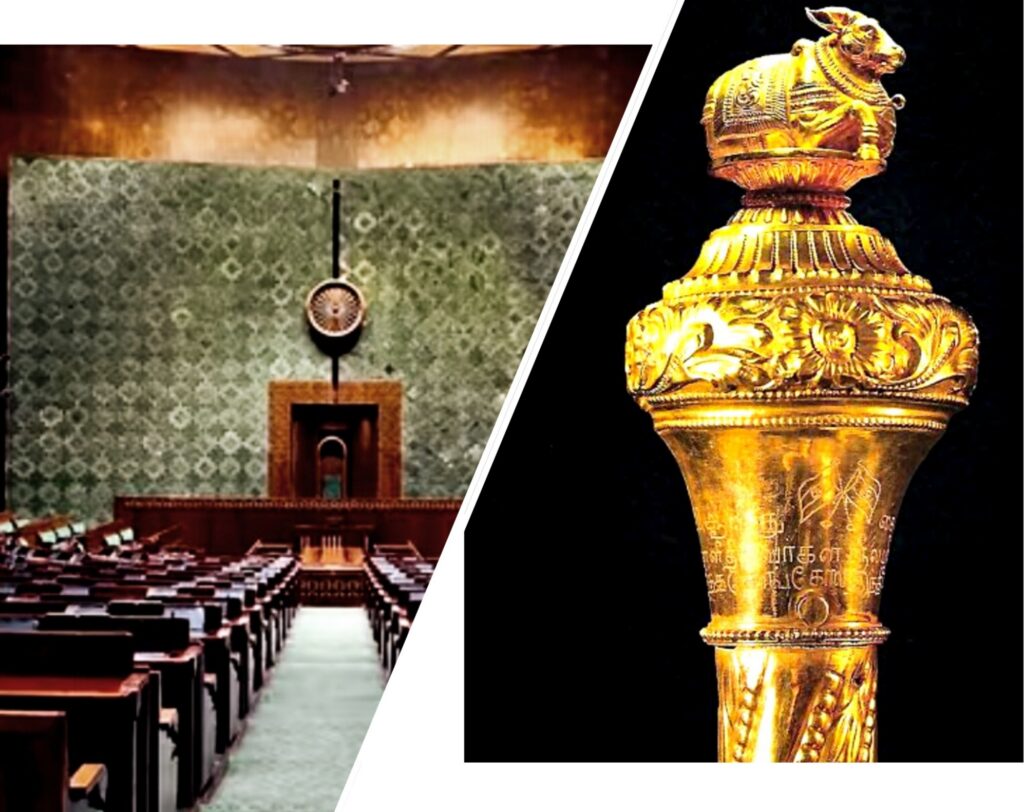Manashimaya

The Sengol controversy has sparked a heated debate in the Indian Parliament, with the Samajwadi Party (SP) demanding its removal and replacement with a copy of the Indian Constitution. The SP MP RK Choudhary has labelled Sengol as a symbol of the monarchy, igniting political tensions. The Bharatiya Janata Party (BJP) has criticised this demand, terming it an insult to Tamil culture.
The Sengol controversy erupted following the formation of Narendra Modi’s 3.0 government, with the opposition asserting its strength against the ruling party on various issues. The installation of Sengol in Parliament has become the latest flashpoint. Amid the ongoing first session of Parliament under the new government, SP MP RK Choudhary’s letter to Lok Sabha Speaker Om Birla and the Protem Speaker has added fuel to the fire. In his letter, Choudhary has called for the removal of Sengol and its replacement with a copy of the Indian Constitution, arguing that the Constitution is the sacred document of India’s democracy, whereas Sengol represents monarchy.
RK Choudhary, representing Maharajganj in Uttar Pradesh, expressed his astonishment at seeing Sengol to the right of the House’s chair. In his letter, he stated, “Our Constitution is a sacred document of India’s democracy, whereas Sengol is a symbol of monarchy. Our Parliament is a temple of democracy, not a palace of any king or royal family.” Choudhary’s demand for replacing Sengol with a giant copy of the Indian Constitution underscores the SP’s call for a constitutional symbol in Parliament.
The Sengol controversy has led the SP to seek support from other parties. Choudhary mentioned that he had not discussed the matter with party president Akhilesh Yadav before writing the letter. However, after the letter gained attention, he spoke with the national president and planned to garner support from allied parties to push for the removal of Sengol. The SP’s call for a constitutional symbol has thus expanded the Sengol controversy, drawing in more political players.
However, the BJP has denounced the proposal made by the SP, characterizing it as a slight to Tamil culture. Yogi Adityanath, the chief minister of Uttar Pradesh, charged that the India Alliance, which includes the SP, harbors animosity towards Tamil culture. He declared that the SP’s remarks on Sengol are illiterate and especially hurtful to those of Tamil ancestry, criticizing their disrespect for Indian history and culture. Yogi Adityanath’s advocacy of Sengol as an emblem of national pride draws attention to the BJP’s position in the Sengol dispute.
The Sengol controversy has seen SP leader Akhilesh Yadav backing RK Choudhary’s letter. He questioned why the government is reluctant to replace Sengol with a copy of the Constitution. Yadav’s support reiterates the SP’s demand for a constitutional symbol in Parliament, further intensifying the Sengol controversy.
The Sengol controversy encapsulates the broader political struggle between the SP’s call for a constitutional symbol and the BJP’s defense of Tamil heritage. As the debate rages on, the resolution of this issue will likely have significant implications for India’s cultural and political landscape. The Sengol controversy, thus, continues to be a focal point of parliamentary discussions, reflecting the ongoing tussle between tradition and modernity in the country.
